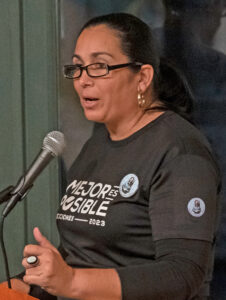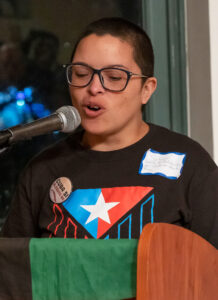
NEW YORK — “Fidel Castro used to tell us, ‘If we had given in just once to the demands of the imperialists, the Cuban Revolution would not exist today. What has stayed their hand is the heroism of our people — the imperialists know the price they would have to pay,’” said Osmayda Hernández, member of the National Secretariat of the Federation of Cuban Women (FMC).

Hernández was one of the featured speakers at a March 11 public meeting here demanding the U.S. government end its six-decade-long economic war against the Cuban Revolution. Held at the Malcolm X and Dr. Betty Shabazz Center, it drew some 150 people.
The rally was part of a two-day conference organized by the US-Cuba Normalization Committee and local Cuba solidarity groups in several U.S. and Canadian cities. The aim of the gathering was to promote activities demanding that Washington remove Cuba from its spurious “State Sponsors of Terrorism” list and end all its economic and travel sanctions against the Cuban people and their government.
Over 200 people attended the March 11-12 conference, held at Fordham University Law School here. Others tuned in online from other cities.
Among the special guests at the gathering were members of the Cuban delegation participating in the annual session of the United Nations Commission on the Status of Women. Several of them spoke in the main sessions and panels at the conference, which also heard greetings from Cuba’s ambassador to the U.N., Pedro Luis Pedroso, and a recorded message from Cuba’s ambassador to the U.S., Lianys Torres.
The opening conference session included presentations on prospects for normalization of U.S.-Cuba relations and efforts to remove Cuba from Washington’s “State Sponsors of Terrorism” list. It was followed by multiple concurrent panels.
Cuba’s deputy ambassador to the U.N., Yuri Gala, spoke on a panel titled “Cuba and the African Diaspora.” He highlighted Cuba’s history of internationalist combat and medical missions in Africa.
Hernández, the FMC’s director of international relations, and Nancy Valiente, president of the National Union of Cuban Jurists in Matanzas province, addressed a panel on “Women’s Rights in Cuba Today.”
Other panels covered subjects from “Cuba and the Labor Movement” to “Resolutions and Legislative Outreach.”
Joining other panelists on “Youth and Cuba Solidarity,” Gabby Prosser, of the Socialist Workers Party in Minneapolis, spoke about her recent visit to Cuba and discussions with leaders of the food workers union there. She contrasted the unsafe conditions she and her co-workers face at an industrial bakery with the control Cuban workers have over safety conditions on the job, a by-product of Cuba’s socialist revolution.
Cuban resistance to U.S. embargo
Washington’s economic war against the people of Cuba affects every aspect of economic and social life there, explained Noemí Rabaza, vice president of the Cuban Institute for Friendship with the Peoples (ICAP), in remarks to the opening session. Hundreds of measures designed to cut off all sources of revenue to the Cuban government “impact wages, the availability of food and medicine, electrical service, international financial transactions, industry, construction, services, trade, investment, health and education,” she said.
“The inclusion of Cuba on the arbitrary U.S. list of countries that allegedly sponsor terrorism,” Rabaza noted, subjects foreign companies and banks to heavy sanctions and thus “prevents access to financing, credit and new investments.”
“Despite the enormous efforts of our government,” FMC leader Hernández told the audience at the rally, “no Cuban family escapes the effects of these inhumane U.S. policies.” Shortages and high prices for food and other essentials “come down especially hard on women,” who shoulder the bulk of responsibility for the care of children and elderly relatives.
Washington is also waging “an intense campaign of political interference in our domestic affairs,” Hernández said. “The purpose is to create political and social instability amid economic hardships created by the U.S. government itself.”
Cubans, she said, are responding with “creative resistance,” using existing resources to solve problems in ways that reinforce solidarity. As part of a National Program for the Advancement of Women, the FMC is helping lead initiatives from setting up child care centers in workplaces to building homes at no cost for single mothers with three or more children.
Also speaking at the rally, Leima Martínez, ICAP’s director for North America, underscored that the event was taking place at the historic site where Malcolm X was assassinated in 1965. That same year, she noted, Cuban volunteers under the command of Ernesto Che Guevara fought alongside liberation fighters in the Congo. Malcolm had welcomed Fidel Castro to Harlem five years earlier.
“Fidel always reminded us that our people come from Africa and we have a debt to the peoples of that continent,” Martínez said.
Example of Cuba’s revolution
Mary-Alice Waters, president of Pathfinder Press and a leader of the Socialist Workers Party, introduced the Cuban delegation at the rally. “The importance of the example of the Cuban Revolution and the work of the FMC over 60-plus years, registered in historic strides toward women’s emancipation, would be hard to exaggerate,” she said.
“The steps necessary to advance women’s participation in the revolution — from the campaign to wipe out illiteracy, to the establishment of child care centers, electrification of the countryside, universal health care, and jobs — have at every stage been led by the revolution’s central leadership starting with Fidel,” Waters said. “They have been an inseparable part of leading working people in the battle to transform society and themselves.”
For opponents of Washington’s attempts to crush the example of Cuba’s working people, Waters said, “our job is above all a political one — to get out the facts, the truth about Cuba’s socialist revolution that the U.S. rulers don’t want us to know. And that includes the transformation of women’s social and economic status.”

Solimar Ortiz, a leader of the Cuba Solidarity Committee in Puerto Rico, told the audience that Puerto Rico and Cuba share more than a century of struggles going back to the 19th century wars of independence from Spain. Today the Cuban Revolution continues to be a powerful example for those fighting U.S. colonial rule in Puerto Rico, she said.
Ortiz reported that last August FBI agents sought to question more than 60 people in Puerto Rico, most of whom had recently gone on the annual solidarity visit to Cuba organized by the Juan Rius Rivera Solidarity Brigade. She is its deputy director. In keeping with the brigade’s unequivocal stance, learned from years of experience with the U.S. political police, all of them refused to talk to the federal cops.
“The solidarity we received from people in the United States and other countries was instrumental in pushing back this FBI attack,” said Ortiz during the final conference session.
Judy Sheridan-González, a member of the New York State Nurses Association, told the rally that her union has organized medical missions to other countries, including Puerto Rico after Hurricane María. “But we organize trips to Cuba to learn.”
Many nurses don’t know much about the Cuban Revolution or they only know what they hear from the U.S. government, she said. “But the conditions they work under here change their attitudes. And visiting Cuba opens their eyes to other possibilities.” Those worsening conditions, she added, led 7,000 nurses at New York hospitals to wage a successful three-day strike in January demanding better staffing and higher pay.
The conference concluded with a session that discussed and adopted an action plan encompassing the activities of diverse solidarity groups across North America. These range from brigades and delegations to Cuba to pushing local city councils to adopt resolutions against the embargo, to car caravans and other public protests against the U.S. economic war on Cuba.






